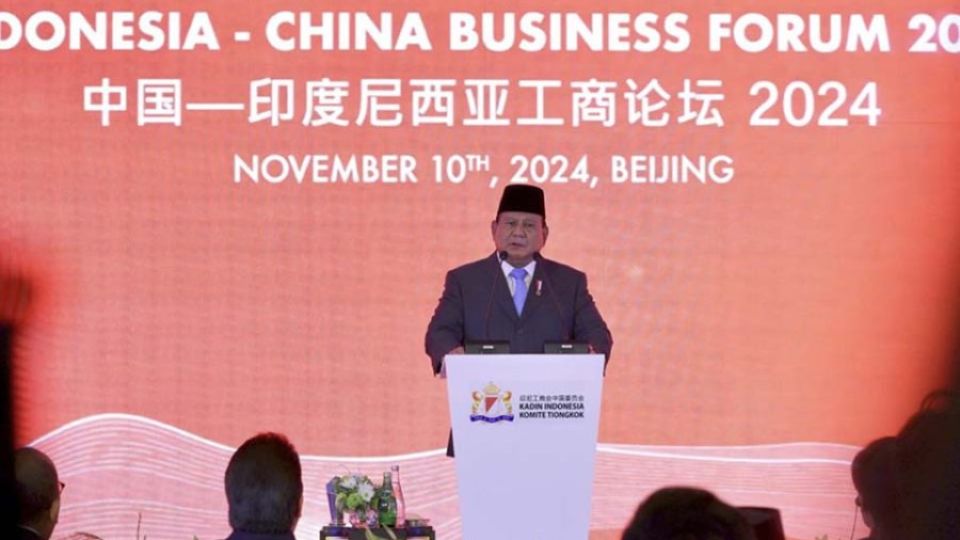November 12, 2024
JAKARTA – Over the weekend, what appears to be a departure from Indonesia’s foreign policy regarding the South China Sea has sparked heated debate.
The issuance of a joint statement with China on Nov. 9, coinciding with President Prabowo Subianto’s maiden state visit has sent Indonesia’s legal and diplomatic circles into a frenzy over the assertion that both sides had “reached [an] important common understanding on joint development in areas of overlapping claims”.
The passage appears to acknowledge, for the first time ever, that Indonesia is a claimant in the South China Sea.
While this overture is supposed to underpin their shared intent for maritime cooperation, Indonesia must vigilantly safeguard its sovereign rights in the North Natuna Sea and ensure that such statements are not misconstrued as a shift toward accommodating China’s expansive claims.
Indonesia’s Foreign Ministry has been prompted to clarify that cooperation with China should not be interpreted as tacit approval of the infamous nine-dash line, which a 2016 international arbitration court ruled has no standing under international law. Beijing refuses to accept this.
Adherence to the principles of the 1982 United Nations Convention on the Law of the Sea (UNCLOS) and the spirit of the 2002 Declaration of Conduct (DoC) in the South China Sea is commendable. But Indonesia’s position as a non-claimant state must remain unequivocal.
First impressions, especially in the realm of international diplomacy, carry significant weight. We assumed Prabowo understood this when he sent his top diplomat to sign Indonesia up for the BRICS bloc as his first foreign policy decision as President.
But the most vital audience for statements on sovereign rights should be Indonesia’s policymakers and the public, not foreign powers looking to reshape regional norms.
The ambiguity present in the joint statement from China risks undermining Indonesia’s long-standing approach. Beijing’s portrayal of this statement as reflecting a “political consensus” raises questions about how Indonesia’s commitment is perceived beyond its borders.
Maritime law experts have noted the potential for this joint statement to be interpreted as an implicit acknowledgment of overlapping claims – an interpretation that could complicate Indonesia’s right to exploit its exclusive economic zones (EEZ) and uphold sovereignty.
It is understandable that Prabowo seeks to foster ties with China early in his term, particularly after confirmation that Donald Trump will return as United States president.
However, past administrations, including that of Prabowo’s predecessor Joko “Jokowi” Widodo, managed this delicate relationship without compromising Indonesia’s maritime boundaries.
Prabowo allowing the joint statement to be issued without addendum, and just weeks after the Indonesian coast guard repeatedly drove a Chinese vessel out of EEZ waters for trespassing, is not an encouraging development..
This situation, if left unattended, could lead to more significant regional and international repercussions. This subtle acknowledgement of China’s claims could be enough to pressure other ASEAN states into softening their decades-long positions on territorial disputes.
The stakes are particularly high at a time when negotiation fatigue is starting to set in, dragging down progress on the elusive Code of Conduct (CoC) in the South China Sea.
Prabowo’s concurrent engagement with the US adds another layer to the strategic complexity of the situation.
The onset of Joe Biden’s lame duck presidency and the temporary absence of Trump’s influence until January could mean that US support will be limited, so any reliance on geopolitical balancing may be precarious.
To uphold Indonesia’s credibility, Prabowo must be transparent about the terms of Indonesia’s cooperation with China. Clarifying the specifics of the “common understanding” referenced in the joint statement is critical.
If Indonesia allows this ambiguity to persist, doubts will deepen over its ability to navigate these geopolitical waters, potentially compromising its standing both regionally and globally.
It will be difficult to come back from a bad first impression, but it is not impossible.


